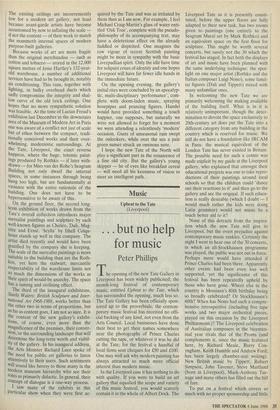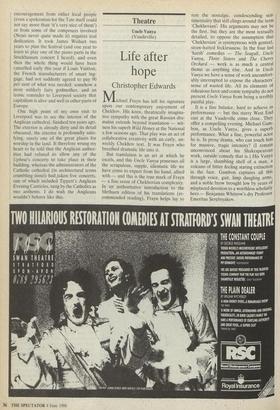Music
. . . but no help for music
Peter Phillips
The opening of the new Tate Gallery in Liverpool has been widely publicised; the month-long festival of contemporary . music, entitled Upbeat to the Tate, which has surrounded the opening, much less so. The Tate Gallery has been officially spon- sored up to the proverbials; the contem- porary music festival has received no offi- cial backing of any kind, not even from the Arts Council. Local businesses have done their best to get their names somewhere near the photographs of Prince Charles cutting the tape, or whatever it was he did at the Tate; for the festival a handful of local firms sent cheques for £50 and £100. One may well ask why modern painting has always attracted so much more official interest than modern music.
In the Liverpool case it has nothing to do with quality. If you were to build an art gallery that equalled the scope and variety of this music festival, you would scarcely contain it in the whole of Albert Dock. The Liverpool Tate as it is presently consti- tuted, before the upper floors are fully adapted to their new task, has two rooms given to paintings (one entirely to the Seagram Mural set by Mark Rothko) and an equivalent space on the first floor for sculpture. This might be worth several concerts, but surely not the 30 which the festival has staged. In fact both the displays of art and music have been planned with the same underlying technique: the spot- light on one major artist (Rothko and the Italian composer Luigi Nono), some famil- iar figures (Dali and Tippett) mixed with many unfamiliar ones.
In welcoming the new Tate we are primarily welcoming the making available of the building itself. What is in it is relatively unimportant, though the deter- mination to devote the space exclusively to 20th-century art does put the Tate into a different category from any building in the country which is reserved for music. We still do not have a foundation like IRCAM in Paris: the musical equivalent of the London Tate has never existed in Britain. The possible need for such a centre was made explicit by my guide at the Liverpool gallery, who explained that amongst their educational projects was one to take repro- ductions of their paintings around local schools so that the children could 'dance out their reactions to it' and then go to the gallery and see the original. If such educa- tion is really desirable (which I doubt — I would much rather the kids were doing Latin grammar) would not music be a much better aid to it?
None of this detracts from the inspira- tion which the new Tate will give to Liverpool, but the overt prejudice against contemporary music rankles. Certainly the night I went to hear one of the 30 concerts, in which an all-Stockhausen programme was played, the public was not out in force. Perhaps more would have attended if Prince Charles had been there. Apparently other events had been even less well supported, yet the significance of this festival has been repeatedly upheld by those who have gone. Where else in the country is Messiaen's 80th birthday being so broadly celebrated? Or Stockhausen's 60th? When has Nono had such a compre- hensive retrospective (including five tape works and two major orchestral pieces, played on this occasion by the Liverpool Philharmonic)? The Liverpool celebration of Australian composers in the bicenten- nial year rivals that of the Proms (and complements it, since the music featured here, by Richard Meale, Barry Con- yngham, Keith Humble and Andrew Ford, has been largely chamber-size writing). New British music by Tippett, Robert Simpson, John Tavener, Steve Martland (born in Liverpool), Mark-Anthony Tur- nage and many others has filled out the bill of fare.
To put on a festival which covers so much with no proper sponsorship and little encouragement from either local people (even a spokesman for the Tate itself could not say more than 'it's very nice of them') or from some of the composers involved (Nono never quite made it) requires real dedication. It took James Wishart two years to plan the festival (and one year to learn to play one of the piano parts in the Stockhausen concert I heard), and even then the whole thing would have been cancelled early this year if Louis Vuitton, the French manufacturers of smart lug- gage, had not suddenly agreed to pay 90 per cent of what was needed: somehow a most unlikely fairy godmother, and an ironic reminder to Liverpool society that capitalism is alive and well in other parts of Europe.
One high point of my own visit to Liverpool was to see the interior of the Anglican cathedral, finished ten years ago. The exterior is already dirty and its detail obscured, the interior is profoundly satis- fying, surely one of the great places for worship in the land. It therefore wrung my heart to be told that the Anglican author- ities had refused ,to allow any of the Upbeat's concerts to take place in their building, whereas the administrators of the Catholic cathedral (in architectural terms crumbling tinsel) had .taken five concerts, one of which included Tippett's Anglican Evening Canticles, sung by the Catholics as two anthems. I do wish the Anglicans wouldn't behave like this.



















































 Previous page
Previous page